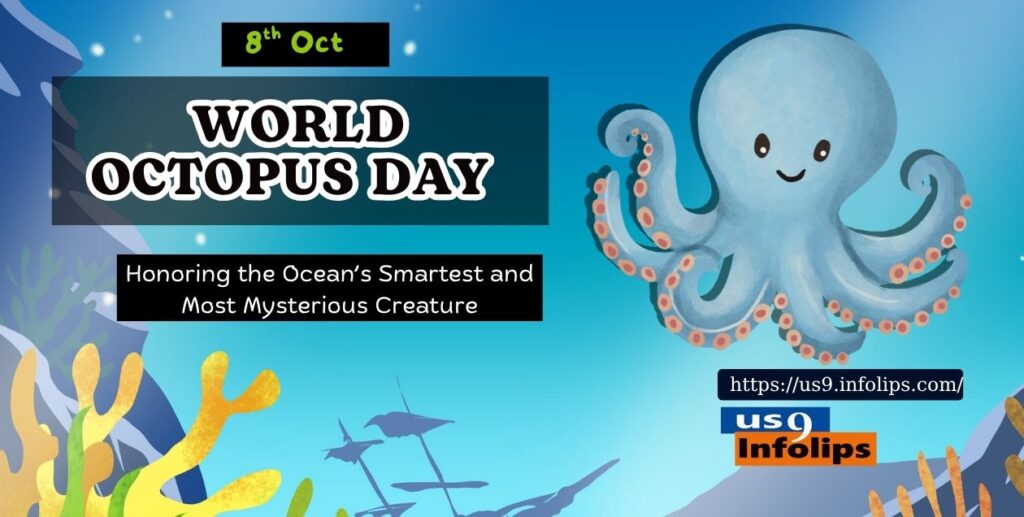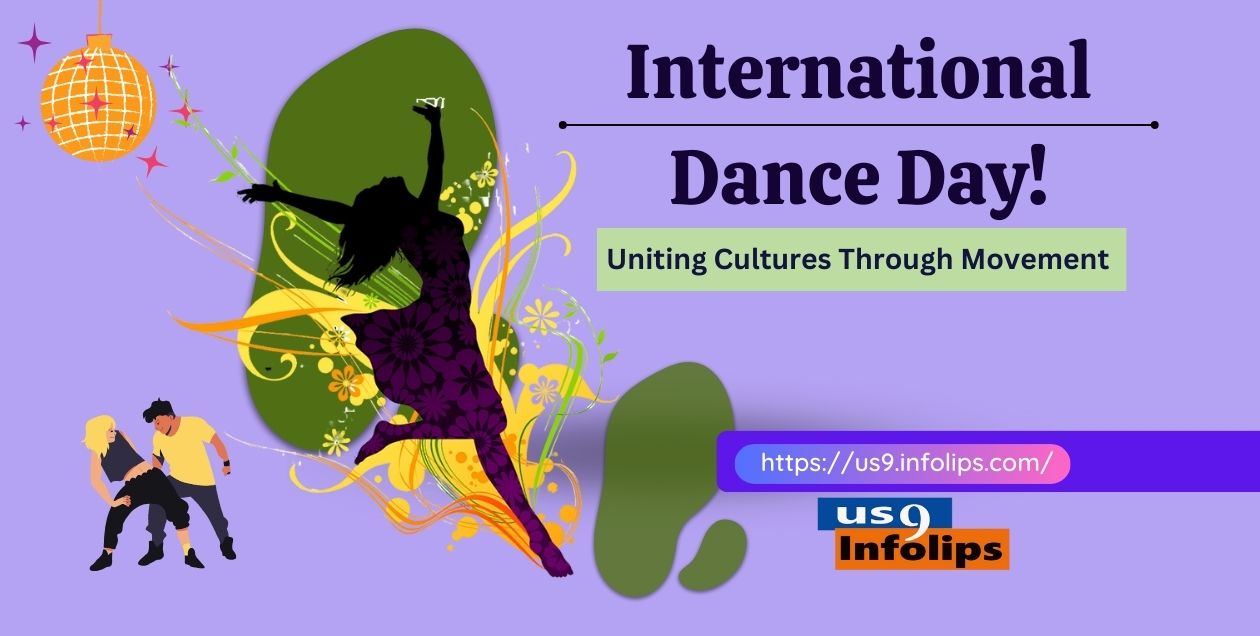World Octopus Day: Celebrating the Marvels of the Ocean’s Most Intelligent Creature
World Octopus Day: Honoring the Ocean’s Smartest and Most Mysterious Creature
1. What is World Octopus Day?
World Octopus Day is celebrated every year on October 8th to honor one of the ocean’s most fascinating and mysterious creatures — the octopus. It’s a special day dedicated to appreciating their intelligence, adaptability, and importance to marine ecosystems. The day also reminds us how vital it is to protect ocean life from threats like pollution, overfishing, and climate change.
2. The History Behind the Day
World Octopus Day began as part of Cephalopod Awareness Days, which run from October 8th to 12th each year. This initiative was started by marine biologists and ocean enthusiasts who wanted to raise awareness about cephalopods — a group that includes octopuses, squids, and cuttlefish. October 8th was chosen because octopuses have eight arms, making the date symbolically perfect.
3. Who Took the Initiative
The idea was popularized by ocean conservation groups such as The Octopus News Magazine Online and other marine awareness communities. Their goal was to educate people about these remarkable animals and encourage global efforts to protect their habitats.
4. The Purpose of Celebrating It
The main purpose of World Octopus Day is to help people understand how intelligent and unique octopuses are. The day also promotes marine conservation, scientific research, and public respect for underwater life. It’s about turning curiosity into care and awareness into action.
5. The Uniqueness of the Octopus
Octopuses are often called the “geniuses of the sea.” They can solve puzzles, open jars, camouflage within seconds, and even escape aquariums! Each of their arms can act independently, making them one of the most advanced invertebrates on Earth. Their mysterious and playful nature continues to fascinate scientists and ocean lovers alike.
6. How It’s Celebrated Around the World
People celebrate this day in many creative ways — from school programs and museum exhibitions to social media campaigns and beach clean-ups. Marine organizations hold talks and awareness drives to educate people about ocean protection. Artists, divers, and teachers also share beautiful octopus-themed artworks, photos, and documentaries.
7. Octopus in Culture and Symbolism
In different cultures, the octopus represents flexibility, intelligence, and mystery. In Japanese folklore, it’s seen as a symbol of transformation. In modern times, the octopus also represents resilience — the ability to adapt and survive even in challenging environments.
8. Environmental Message of the Day
World Octopus Day carries a strong environmental message: our oceans are in danger. Through this day, people are encouraged to reduce plastic use, support sustainable seafood, and protect coral reefs — because the survival of the octopus depends on the health of the sea.
9. A Message for Future Generations
This day is a gentle reminder to future generations — the ocean is full of wonders we still don’t fully understand. Protecting creatures like the octopus is not just about saving a species, but about preserving the balance of life beneath the waves.
9 Objectives of World Octopus Day (Short Form)
- Raise awareness about octopus intelligence.
- Promote ocean conservation.
- Encourage marine education.
- Support scientific research.
- Protect marine habitats.
- Reduce ocean pollution.
- Highlight the importance of biodiversity.
- Celebrate ocean life.
- Inspire people to take action for marine health.
9 Facts About World Octopus Day
- Celebrated every year on October 8th.
- Part of the Cephalopod Awareness Days week.
- Chosen for the octopus’s eight arms.
- Supported by marine conservation groups worldwide.
- First celebrated in the early 2000s.
- Encourages sustainable seafood consumption.
- Promotes documentaries and educational content.
- Recognized by oceanic organizations and aquariums.
- Focuses on protecting endangered octopus species.
9 Interesting & Unknown Facts About Octopuses
- They have three hearts and blue blood.
- Each arm has its own “mini-brain.”
- They can change color and texture in less than a second.
- Octopuses are escape artists — they can fit through tiny spaces.
- They taste with their suction cups.
- Most species live only 1–2 years.
- They use tools, like coconut shells, for protection.
- An octopus can regrow a lost arm.
- Some species, like the mimic octopus, can imitate other sea creatures.
9 Controversies About World Octopus Day
- Debate over keeping octopuses in aquariums.
- Ethical issues in octopus farming.
- Cultural disputes about octopus consumption.
- Concerns about animal testing on octopuses.
- Disagreement over octopus intelligence comparisons with mammals.
- Environmental concerns about tourism affecting octopus habitats.
- Lack of global recognition for the day.
- Misrepresentation in media as “monsters.”
- Debates over protection laws for cephalopods.
Conclusion
World Octopus Day is more than just a celebration — it’s a heartfelt tribute to one of nature’s most incredible creations. This day encourages us to look deeper into the ocean, to admire the intelligence that thrives there, and to act responsibly toward protecting it. The octopus teaches us adaptability, patience, and the art of survival — lessons that are just as valuable on land as they are in the sea.
9 FAQs
1. When is World Octopus Day celebrated?
On October 8th every year.
2. Why was October 8th chosen?
Because octopuses have eight arms — matching the date.
3. Who started World Octopus Day?
Marine biologists and ocean awareness groups.
4. What is the goal of this day?
To raise awareness about octopus intelligence and ocean conservation.
5. How can people celebrate it?
By learning, sharing, and supporting marine life protection.
6. Are octopuses endangered?
Some species are threatened due to overfishing and habitat loss.
7. Do octopuses recognize humans?
Yes, some studies show they can remember and recognize people.
8. What is the biggest octopus species?
The Giant Pacific Octopus — it can weigh up to 50 kg.
9. Can an octopus change its color?
Yes, instantly — to blend, hide, or communicate.
Disclaimer: This article is written for educational and awareness purposes to celebrate World Octopus Day and promote ocean conservation. All information is gathered from publicly available marine research and verified environmental sources.
Follow us for more captivating articles and stay connected to explore the world. Let’s embrace the power of communication and understanding.

Related topics:
1. Perfect World Travel Guide
2. 9 Most Popular EV Cars in the USA
3. 9 Best Things About Apple TV 4K – Third Generation
4. Think before You Renew Amazon Prime
5. Jimmy Carter: A Great Legacy
6. Memorial Day: Honoring the Sacrifice, Celebrating Freedom
School Site :
For English grammar and lot more : Smart School Infolips
Marathi Poems: Marathi Rang
Technology : Tech Site












You explained this so clearly. I finally get it.
Thank a lot for you comment, really it means a lot. Thank you, stay with us!